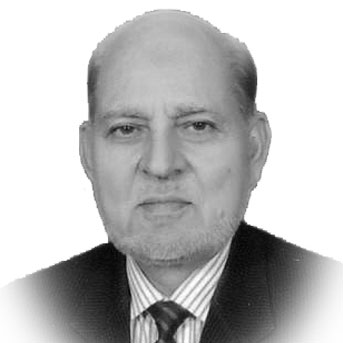Muhammad Hanif
INDIA was first ruled by the Muslims for 700 years and then by the Britain for 300 years up to August 1947. Pakistan was created on 14 August 1947 through the division of British India into two dominions, named as Pakistan and India. This division occurred in August 1947, when the Great Britain’s hold over its colonized countries had weakened as a consequence of the high costs of the World War II, and then most of those countries were being given freedom based on their right to self-determination as recognized by the United Nations. That process of decolonization was also being supported by the next superpower, the United States of America. Much before the division of India, both the Indian Congress and All India Muslim League (AIML), led by Quaid-i-Azam, Muhammad Ali Jinnah, were struggling to free India from the British rule, as a united country. However, the Muslims’ apprehensions about Hindu domination in united India came true, when in 1928 during India’s all parties conference, Quaid-i-Azam’s following main demands to be included in the future Indian Constitution were rejected by the Indian Congress; in independent India, in the Central Legislature, Muslims’ representation shall not be less than one third, one-third representation shall be given to Muslims in both central and provincial cabinets, and the Muslims should be given an adequate share in all services, with the constitutional guarantees.
In the light of the above, the Muslim League led by Quaid-i-Azam decided to struggle for a separate homeland for the Muslims and Quaid-i-Azam used the two-nation theory as the main argument to convince the British Government to divide the British India into two dominions. Mr Jinnah explained the theory, “It is a dream that the Hindus and Muslims can ever evolve a common nationality. Hindus and Muslims belong to two different religious philosophies, social customs and literary traditions. They neither intermarry nor eat together, and indeed they belong to two different civilisations which are based mainly on conflicting ideas and conceptions’’. Thus, Pakistan was created as an independent country on 14 August 1947 to be called as the Muslims’ and minorities’ homeland to ensure the basic, religious and other rights of the Muslims and other minorities in Pakistan, based on the Islamic precepts which guarantee the rights of the people of other religions living within the boundaries of an Islamic State. To ensure this, Quaid-i-Azam stressed through his speeches that Pakistan’s constitution and the system of the government will be democratic based on Islamic values projected in the Quran and Sunnah of the Holy Prophet (Peace Be Upon Him).
And, that is the reason that Pakistan’s Constitution embodies Islamic values and it provides guarantees to protect the rights of the minorities in Pakistan. The current plight of the Kashmiri Muslims in the IIOJK, the Muslims in India, and even Christians and Sikhs there indicate that Pakistan’s creation as their motherland was the only option for the Indian Muslims’ salvation, where they could be free from Hindu domination and practise their religion freely, and get their other rights, and the rights of the minorities living in Pakistan, could also be protected in a much better way than in the united India. However, since its independence, except some spells of success stories, Pakistan has faced many issues and lacked progress in the political, education, health, nation building, socioeconomic and scientific fields because of the majority of the power hungry, incompetent and corrupt political leaders and less responsive and corrupt bureaucracy, which ignored the true implementation of the constitutional provisions, upholding the true Islamic values, efficiency standards, and instead have nurtured greedy politics, corruption, nepotism, inefficiency, provincialism, weakening and corrupting the important national institutions, failures in uploading Islamic based democratic values and preferring party and provincial interests over the country’s interests.
Likewise, many of the parents, education leaders, religious leaders, local intelligencia and leaders and media managers also failed in character building of the people as well as welding them into a strong nation, imbued with proper Islamic and democratic values, and true love for Pakistan as a mother land. Although, there is no doubt that Pakistan owes its success stories and some great strengths to an enviable number of sincere and dedicated leaders, bureaucrats, officials, educationists, scientists, judges, lawyers, media persons, industrialists, businessmen, expatriates, military leaders and other national heroes, services of whom should always be remembered and acknowledged. In view of the above, in the light of the history of Pakistan’s creation, Quaid-i-Azam’s vision of Pakistan as a democratic country with its constitution guided by the Quran and Sunnah, and the above-mentioned performance related weakness and issues, to move forward to attain its aspired position in the comity of nations, Pakistan needs that its political leaders, bureaucrats, educationists, judges, lawyers, police officials, services officials, industrial and business leaders, media managers, scientists, military officials and influential members of the civil society, working together as the leaders and responsible citizens, rise to the occasion by rejecting the past bad traditions, correct themselves and lead the Pakistani nation to work for the country with the utter dedication, honesty, integrity, fairplay, hardwork and exceptional efficiency and sincerity. This dedicated national effort shall definitely make Pakistan a truly democratic country based on the Islamic values and strengthen Pakistan politically, economically, socially, religiously and militarily, to turn Pakistan into a much stronger and sovereign, Islamic welfare state, to be cherished by the other nations of the world.
—The writer is an ex-Army Colonel and Senior Research Fellow, Strategic Vision Institute, Islamabad.










